- Home
- Adam Cesare
Bone Meal Broth Page 5
Bone Meal Broth Read online
Page 5
It’s not a human scream though. She was making this high-pitched sound like an old television tuned to the wrong input, only fifty times louder. It’s terrible. I started yelling for her to stop and she didn’t. She just stood there. Her mouth wasn’t even fully open, but the screech was louder than you would believe.
I took a pen from the coffee table and tried to find the reset switch on her side. I flipped up the nightie, started running my hands over her back, and finally found it. The reset button was disguised to look like a mole. It’s about the size of a flea and the pen was too thick to fit in. I finally forced the pen in, but when I pushed it, nothing happened.
I felt like my eardrums were going to pop and my brain was going to start seeping out. The pain was excruciating. I had to make it stop.
I went into my bedroom and got the Browning.
I thought there would be nothing too it, that it would be like shooting at a faulty toaster, but when I raised the gun to fire, everything just drained out of me and the little gun felt like it’s fifty pounds.
It wasn’t how expensive the repairs were going to be, it was the idea of shooting someone, even though I knew she wasn’t a real person, just a doll. I always hated those old horror movies where you watched them and you felt like the director was really getting off on some girl’s suffering. This was different, I told myself.
The sound persisted and I wasn’t going to get any more used to it. It had to end—so I shot her.
The first shot only dampened the noise; the second stopped it.
A couple of weeks after that, I went down to the store and picked up a replacement. But the thing that still gives me the creeps about that day is a question I had to ask myself when it was over: Why did old Grant make it look like they were bleeding?
The Girls in the Woods
On days when the wind carried enough of a chill or times when she was bored enough, Blair would warm herself by holding the pink palms of her hands up to the glow of her cigarette for as long as she could stand it. She would recoil before doing any serious damage, but for a few moments afterward, her hands would carry tender, rosy stigmata.
Looking out into the woods behind her house, she cupped her fists, one at a time, around the cig and made a miniature lantern out of each of her hands. Her mother spoke from behind her, and she nearly singed herself in her excitement. “We’re going to have to put a second hospital bed next to your dad’s if you keep on smoking those,” her mother said. Blair didn’t turn to see her wiggle out from between the busted screen door, but she heard her mother’s heavy footsteps strain the old wood of the back porch.
“Smoking doesn’t give you mesothelioma,” Blair said, squinting against her own puff of smoke and keeping her eyes fixed on the tree line, not looking as her mother sidled up next to her against the porch banister.
“He’s only going to get worse, you know.” She paused. “It’s only going to get worse to be around.” It was odd to hear her mother speak this way. The voice was her own, but the tone was detached and matter-of-fact, not attributes she associated with her mom, the supervisor of sleepovers and founder of “Toll House Tuesdays.”
“I know that,” Blair said, turning to look at her mother for the first time and seeing her tears catch the glint off the porch light. “You’re crying. Is he all right?”
“He’s fine, sleeping now. You can tell it hurts him so bad. He snuck an extra pill while he thought I wasn’t looking. The man doesn’t want to scare me, but I’m scared as hell.”
Before she knew it, they were wrapped together in a firm hug. Blair, a foot taller than her mom, stooping to get her arms around her, felt the warm tears on her neck and stubbed out her cigarette on the railing behind her mother before flicking it onto the lawn. Blair laid one hand flat on her mother’s back and made slow, calming circles.
“Summer is over, you shouldn’t be here,” her mother wept into her shoulder. “Go back to school.”
“I belong right here,” Blair said, assuring her mother but opening her eyes to stare out into the darkness of the woods. There was nothing else for her to do here but hug her mother and change bedpans, and they both knew it. The urge to escape held quite a pull. She could flee back to Boston and deal with death over the phone. She squinted against the night and was surprised when her own cheeks cooled with tears. She had thought she was done with crying. Through the tears, out in the nothingness of the forest, she could see lights.
“It’s going to be okay, Mom,” Blair said.
“No, it won’t,” her mother said, but Blair didn’t hear her. She was too busy looking out at the two bouncing lights in the forest.
I’m gathering the offerings for Daddy today. The little girl could barely keep the words from bubbling over her mind and out of her mouth. She stayed silent, like she had been taught. She was also told not to crack a single branch or rustle a single patch of dead leaves, so she stepped soft and carefully, even though she wanted to skip and dance around the tall, old trees of the forest in the first morning light.
She and her father had visited many forests, and this one was not much different. Smaller, maybe, but in the early morning it still took on that musical silence, as if all the minor sounds of the forest were conspiring along with her to keep her hidden. Just ahead of her an offering was rooting around for a fallen acorn, and she stopped a few feet away.
Placing one bare foot against a knee-high sapling, she pressed down until its top leaves were brushing against the forest floor, its young bark taut as a bowstring. As she leapt forward toward the squirrel, she cracked the infant tree, a tiny warning sound meant to set the animal at attention.
The squirrel didn’t react to her warning until it was too late. The girl snatched it up by the nape of the neck with both hands and broke its spine before it could let out as much as a squeak.
Lifting the corpse so it was eye-to-eye, she frowned and cooed softly to it like a baby doll. “I’m sorry, I really am,” she said, and looped the squirrel’s tail twice around her woven belt and continued on. Her bare feet never once rustled a leaf or snapped a twig unless she wanted them to.
“Come back,” Blair said, wheezing as she ran after the little girl with flowers in her hair. She hadn’t exercised since the last time she had been to the campus gym, and since coming home she smoked a pack of Parliaments a day. There would be no catching the little girl. Her footfalls were heavy and clumsy, and she prayed that she wouldn’t catch a root and twist her ankle. When the little girl was just about out of sight—right when Blair was ready to give up and rest against a tree—the little girl stopped and turned around.
She wore a plain brown dress, adorned with loops of dried grasses, bordered at the shoulders with fresh green vines, with a dark leather belt around her waist. When Blair was a little girl herself, she had played the Wise Old Tree in her fourth-grade play. The little girl reminded her of herself and the costume that her father had helped her make out of burlap and green tights.
The girl lifted one corner of her mouth in a cute, mischievous variant of a smile, then raised one dirt-smudged hand in a wave and stepped behind a tree and was gone.
Sucking in greedy mouthfuls of air and wiping the sweat and hair out of her eyes, Blair stood staring at the tree the girl had disappeared behind. The trunk was maybe half a foot in diameter, much too slender to hide the little girl—if there even had been a little girl at all.
Still panting, Blair felt herself beginning to crack, a sob of frustration rising up in her throat. She pressed her eyes closed and tried to stop the tears. When she could not, she looked down at her feet and recoiled at the broken corpse of a squirrel.
“What am I doing here?” she asked herself.
The little girl stayed in her invisible vantage point behind the tree for a long time, watching and listening to the young woman who had pursued her.
The girl, whose day had started out so promising, had not only lost her squirrel in the chase but, even worse, had allow
ed herself to be spotted. Her mind did somersaults as her cheeks began to flush from the embarrassment of being caught out in the broad daylight.
She listened as the young woman in the jeans and nightshirt began to tremble and then cry and curse herself under her breath. The little girl was not positive, but she did not think that she was the reason for the young woman’s sadness. The little girl could smell the young woman now. The woman hadn’t washed herself in days, and the stink of old tears, tobacco smoke, and body odor combined into something like despair. The little girl considered her options for a moment and then stepped out from behind the tree.
“Don’t cry,” she said, and her small voice made the young woman jump so that she nearly fell backward. The little girl couldn’t help it; she giggled.
“How did you do that?” the woman asked. Her voice was shaky from either the residual sobs or her surprise.
“Magic. See?” The little girl thrust one hand behind the tree up to her elbow, but her hand did not come out the other side. She let the amazement sink in, but only for a moment, and then spoke again. “Why are you crying?”
“Because I’m losing my mind,” the young woman said as she laughed, not a happy laugh but a loud one. “I’m hallucinating,” she said, and looked around at the forest. “And I’m completely lost in the woods behind my house.”
“What else?” the little girl asked, knowing that there was something else on the list.
“Oh, and my dad’s dying.”
“Is he sick?” The little girl didn’t need to force sweetness into her tone; it always sounded that way.
“Sick? He’s a walking, coughing, shitting skeleton.” The young woman held her hand up to her mouth, her tears resuming their flow. “I’m sorry I swore.”
“It’s okay.” The little girl walked forward a few yards toward the older woman, stopping at what she judged a safe distance. “I think, maybe,” the little girl said, “that my daddy can help your daddy. If you want.”
“A picnic, she says, a goddamn picnic. It’s not like I can eat much,” Blair’s father said into her ear as she shouldered his weight, helping him over a fallen log. She could feel the withered sinews of his muscles rubbing against the excess material of his T-shirt and the shirt, in turn, rubbing against her bare forearm. “Blair baby, I’m tired,” he said. His breath was caustic. Brushing his teeth had become too painful, so he now had to settle for swishing with salt water and a drop of Listerine.
“Just a bit farther, Dad, then we can rest. The clearing is right up here.” She had gotten better at hiding her emotions while in her father’s presence. At the beginning of the summer, she returned home after his second round of radiation, and it took a week to be able to look her dad in the eye without tearing up.
When they reached the clearing, she laid down the two beach towels she had brought from home. Her hands were shaking, not because of the cold but from the very real prospect that she had imagined the whole thing—imagined the magic little girl and imagined their deal.
Her father leaned against a tree, one of the few pines that spotted the forest with a bit of green in autumn.
“Let me help you sit.” Blair smoothed out the last corner of a towel and stepped up to her father. She took his left hand with both of hers. His skin felt delicate and dry under her sweaty palms, and she worried that she would tear him like crepe paper.
“My ass is too skinny to sit like this for very long,” her father said, laughing even though it was a legitimate complaint. He’d lost almost half his body weight, and he wasn’t a big man to begin with. “What’s for lunch?”
Blair had made some peanut-butter sandwiches just in case they walked out into the middle of the woods and nothing happened. As she bent down over her knapsack and unraveled the plastic baggie full of two soggy sandwiches, the edges of her vision darkened. It was a darkness so complete that it was impossible to mistake it for a shift of the clouds—it was a shadow.
Blair looked up into the shadow, beyond where it ended on the forest floor, to see more shadow. It was a living, fluid shadow that weaved itself in and around the boughs of the surrounding trees. The massive black blur was topped with two bright green lights, like the disembodied headlights of some phantom car.
“What is it, Blair, what is it?” her father asked, looking not at the shadow but at Blair as she knelt down before it.
Can he even see it? she thought.
The giant form groaned. It must have had some mass to it somewhere. It wasn’t just smoke, because the tops of the trees above its green eyes swayed as it moved.
Blair couldn’t scream, couldn’t cry. She just knelt and watched.
The woman’s father, the weak man who stood next to her now, kept calling out her name, shaking her shoulder gently.
“Blair. That’s a pretty name,” the little girl said, her vision clearing as she stepped out from under the cool, dark mist of her father. She watched closely as Blair dropped her eyes from the shadow for a moment to look down at her and then flicked them back higher up, looking her father in his big green eyes.
The little girl’s father was almost as tall as the tallest tree in the forest, and Blair’s eyes looked frantic to take in all of him. “Please don’t be afraid.” The little girl directed her words to both Blair and her father, who was coughing heavily now and leaning back on the closest tree. He looked and sounded very sick.
Blair’s eyes never left the shadow in front of her, but she spoke to the little girl as she walked up beside her. “You said that he could help my dad. Said that he could cure him.”
“He can,” the little girl answered. She was telling the truth.
“Will he?” Blair asked, her eyes still wide as she looked unblinkingly upon the little girl’s father. The father of this whole forest, of all the forests that ever were.
“That’s up to him. I don’t know. I hope he does,” she said, stepping behind the young woman and then reaching out her arms. The little girl placed both of her strong tiny hands at the base of Blair’s neck. Then, just as she had done with the squirrel, she prepared to make her father an offering.
The White Halloween
It was like that song said at the beginning of Fiddler on the Roof: tradition was everything.
George wasn’t big into musicals. He was not Jewish or really religious in any way, but because of his own traditions he knew exactly what that song was about. The seventy-eight-year-old understood tradition and ritual as they pertained to his favorite holiday: Halloween.
The root of his long-standing infatuation with All Hallows’ had always been something of a mystery to George. He held no particular love for children (he and his wife had never had any of their own). He didn’t really have a sweet tooth. He didn’t even have much love for scary movies. Though he enjoyed a classic monster movie every now and again, he hated the newer kind—the kind with all the blood.
George would rack his mind for the source of it. For example, he remembered that his father had brought him to a double feature of Frankenstein Meets the Wolfman and Abbot and Costello Meet the Killer, Boris Karloff when he was just a child. He liked the movies well enough. Maybe they had sown the seeds of Halloween inside him, but he doubted it. His father didn’t even stay for half of the first feature that day. George had to pick him up at the bar next door after the second picture had ended.
Whatever the reason, the old man loved Halloween.
Kids on parade in their costumes, the smell of popcorn balls, raking fallen leaves into big orange garbage bags that looked like pumpkins, those chocolate coins with pictures of bats and Dracula on them that tasted like plastic (but you could only get them once a year, so you enjoyed them anyway). All of this was part of the tradition, but there was more to it than that.
It is about cultural preservation, he would often say. Something you could do that those crazy bastards trying to blow us up couldn’t do, and they hated us for it. At least this was George’s post-9/11 defense of his obsession wh
en arguing with his late wife.
George didn’t believe in starting to decorate for the holiday a month in advance, as everyone in the neighborhood seemed to do these days. So a few days before the thirty-first he would go into the garage and bring out his large plastic containers filled with rubber bats, paper jack-o’-lanterns, and plastic-bag ghosts. He would then put a novelty song record on his turntable and begin to unpack.
In the past few years the process had taken longer than usual. In his old age George became tired and winded more easily. His legs and back would sometimes lock up on him. He had to be careful because he didn’t want to kill himself and miss out on what could very well be one of his last few Halloweens.
For the past three decades he had help decorating, but this was the third year since his wife’s passing that he had put everything up alone. Muriel was not exactly as hooked on tradition as he was, but she was supportive to the extent that she’d hold the ladder as George hung a witch from the old cypress tree in the front yard. She was a strong-willed woman who could knock sense into her husband when he really needed it, but the rest of the time she left him well enough alone.
This would have to be the first year since buying her in an online auction that old witchy didn’t get hung up outside.
Not only did George not have anyone to hold the ladder but winter had blown into town early. It was twenty-five degrees outside. If he didn’t break his neck getting her up there, he’d be a geriatric Popsicle before he could work his old legs and climb down. He sighed and returned her to the box. Maybe next year global warming would finally live up to its name.
In Islip Terrace, New York, it was not supposed to snow on Halloween.
“It’s not supposed to fucking snow on Halloween,” Tommy yelled at the TV screen. He tightened his grip on the remote control and then threw it to the floor, bouncing it off the carpet of the family room. The weather forecast had ended and now it was on to sports. Usually the sports segment would have helped to soothe Tommy, but the Yankees really blew this season, so it only drew him deeper into his fit.

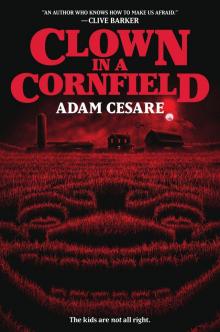 Clown in a Cornfield
Clown in a Cornfield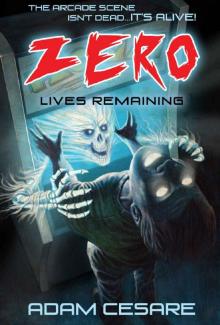 Zero Lives Remaining
Zero Lives Remaining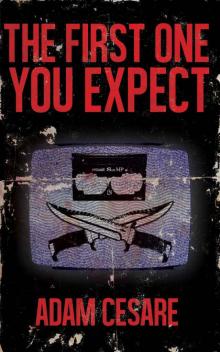 The First One You Expect
The First One You Expect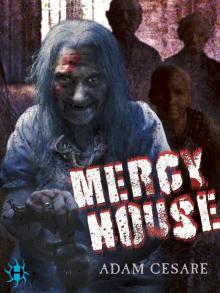 Mercy House
Mercy House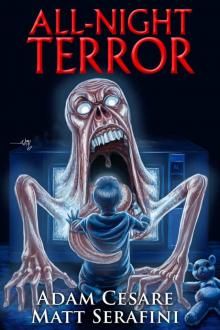 All-Night Terror
All-Night Terror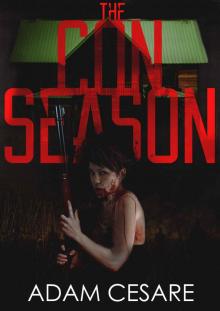 The Con Season: A Novel of Survival Horror
The Con Season: A Novel of Survival Horror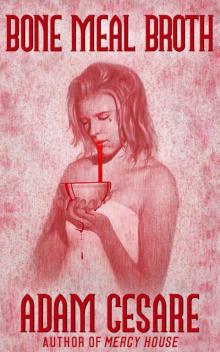 Bone Meal Broth
Bone Meal Broth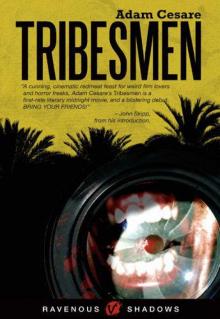 Tribesmen
Tribesmen